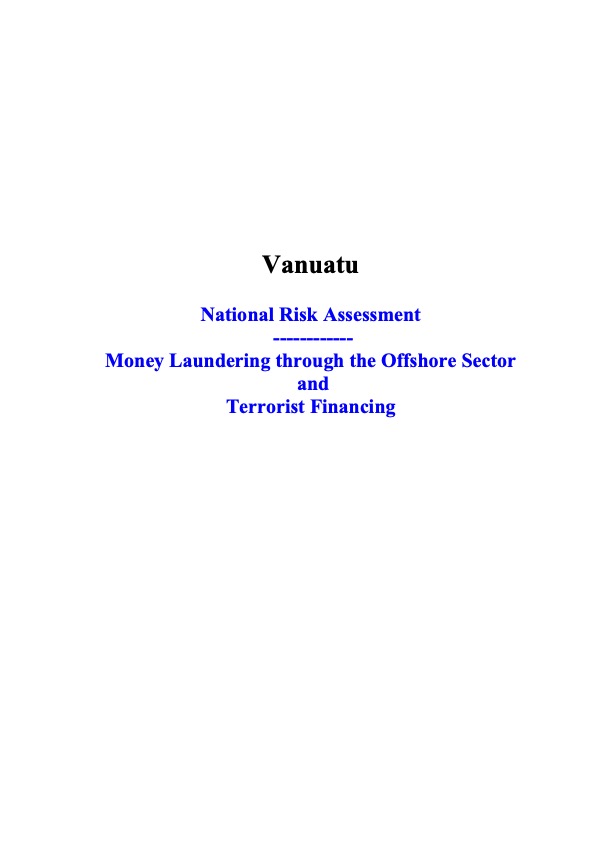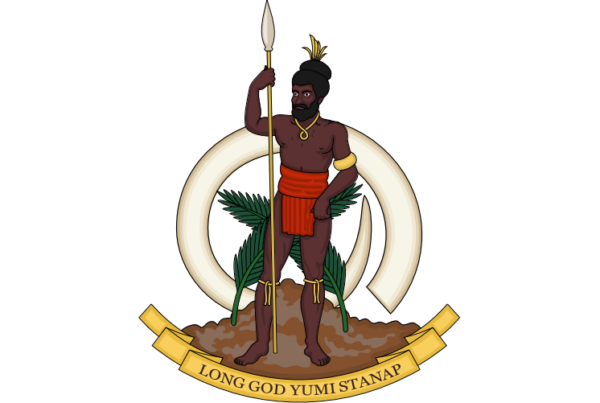Introduction
This document represents Vanuatu’s National Risk Assessment (NRA) in relation to two aspects: money laundering through the Offshore Financial Centre (OFC) and terrorist financing. The assessment was undertaken over the period February-July 2017. It complements an earlier NRA, completed in January 2015, and seeks to expand on the two issues that were not fully explored in the original NRA. As a result, this current document does not seek to address the background to the concepts of money laundering and terrorist financing, and the dangers that they pose to a country’s financial system, economic development and international reputation. Discussion of these issues can be found in the relevant sections of the original NRA.
The preparation of this NRA was overseen by the National Coordinating Committee on Anti-Money Laundering and Combating the Financing of Terrorism (NCC). The methodology employed involved (a) initial oral input from a broad range of stakeholders in the country, from both the public and private sectors, in order to gather their perceptions of the money laundering and terrorist financing threats and vulnerabilities faced by the country; (b) the analysis of written responses to tailored questionnaires, circulated to both public and private sector stakeholders, seeking to collect core data; (c) follow-up meetings with relevant parties to further develop the information provided; and (d) meetings of the NCC and workshops involving all interested stakeholders (both public and private) to discuss and validate the findings from the assessment.
The basic approach adopted in preparing the NRA has been to consider the threats and vulnerabilities faced by Vanuatu in relation to money laundering (ML) through the OFC and terrorist financing (TF), in general. A threat is a person, group of people, object or activity with the potential to harm, for example, the state, society, the economy, the financial system, etc. Vulnerabilities comprise those things that can be exploited by the threats, or may support or facilitate their activities. The response to these issues will necessarily involve the adoption of a risk-based approach to addressing the challenges, in order to be able to allocate the country’s limited resources to best effect.
Vanuatu has made important progress in recent years towards strengthening its defences in relation to anti-money laundering and combating the financing of terrorism (AML/CFT). Since early-2016, the Government of Vanuatu (in partnership with the private sector stakeholders) has been heavily engaged with the International Cooperation Review Group (ICRG) of the Financial Action Task Force (FATF) as part of the Government’s efforts to bring the AML/CFT framework into line with international standards. This has resulted in a major initiative to update legislation and to improve awareness of AML/CFT issues within both the public and private sectors. A total of 31 laws have been identified as requiring amendments, of which thirteen (judged to be an absolute priority) were enacted by parliament and brought into force on 16 June 2017. This action has addressed quite significantly the potential vulnerabilities that existed at the time when the current risk assessment was started in January 2017. It is an important step forward towards ensuring that the overall framework is not only in compliance with international standards at a technical level, but is also implemented in an effective and robust manner. The remaining amendments, which are mostly consequential to the changes brought about by the priority legislation, will be addressed in due course.
In undertaking the NRA, it must be recognised that there were a number of challenges towards obtaining firm evidence on which to make reasoned judgements. These included limitations on (a) the data maintained by the authorities in relation to criminal activity involving the offshore sector; (b) the data and information collected through the regulatory process; and (c) the information on the activities undertaken by non-resident institutions and entities taking advantage of the OFC. Where consolidated data has been available, the assessment has sought to consider trends and overall developments over the three-year period, 2014-2016. In practice, much of the assessment of the threats faced by Vanuatu has had to be prepared on the basis of general perceptions within the public and private sectors, rather than on empirical evidence, although information obtained from external sources (primarily the Internet) has been valuable in producing some case studies.
The following assessment is split into two sections. The first part deals specifically with the ML risks within the offshore sector, while the second part addresses TF risks in relation to both the domestic and offshore sectors
Key Findings
- Overall, Vanuatu’s offshore sector is very small by international comparison, in terms of both the scale and scope of the activities being undertaken. Most of the sector has been in marked decline for several years.
- The number of international companies has been falling year-on-year (currently about 4,500) with a high annual turnover. It is believed that the majority of the active companies are used as investment or asset-holding vehicles. The only growth area involves business from the Peoples Republic of China.
- The international banking sector is very small, comprising six institutions with total assets of only US$106 million. The banks are engaged primarily in private banking and in-house treasury operations. Regulation of the sector has improved significantly in recent years, but there continue to be some challenges to ensuring that the sector is not open to criminal abuse.
- The number of licensed securities dealers has increased rapidly since 2015, and the sector has not been subject to effective supervision. There is little information available on the activity within this sector. The regulator has recently been given new statutory powers as part of an attempt to improve supervision and to mitigate the potential risks.
- While the legal and regulatory frameworks in relation to money laundering and terrorist financing have previously lagged behind international standards, substantial progress has been made since 2016 to bring appropriate legislation into force. These reforms are continuing.
- Due to a shortage of data and broader evidence, it is difficult to assess the exact nature and potential scale of money laundering within the offshore sector, but there is no evidence to suggest that it takes place on a substantial scale.
- All stakeholders perceive foreign tax evasion as the most common threat posed to the offshore sector, but measures have very recently been introduced to make such activity a predicate offence for money laundering in Vanuatu. This will strengthen the authorities’ hands in providing international cooperation in this area.
- Fraud, illicit transnational flows and infiltration by organised criminal groups are also recognised as potential threats.
- The law enforcement agencies have never investigated criminal activity within the offshore sector, and they have limited capacity to undertake the potentially complex financial analysis that would be required. A specialist Money Laundering Unit was established within the Police Force in early-2017, and the delivery of appropriate training to improve capacity is a priority.
- The regulatory and supervisory authorities have recently been given enhanced statutory powers, but human and financial resources are under pressure, resulting in challenges in implementing an effective regime to ensure compliance with AML/CFT measures.
- The NCC has mandated two Working Groups (Supervision and Law Enforcement) to work closely with the government agencies on the implementation stages. The Supervision Working Group has been working on an overall supervisory framework.
- No financial or other sanctions have yet been applied to institutions within the offshore sector for non-compliance with AML/CFT obligations, but recent amendments to the AML/CFT law broaden the scope of the available measures. The VFIU will give particular attention to ensuring that effective, proportionate and dissuasive sanctions are applied where necessary in the future.
- Significant steps have been taken recently to improve transparency in relation to international companies. Companies are now required to file beneficial ownership information with the VFSC, bearer shares have been abolished, and the strict secrecy provisions have been extensively changed to permit greater access to, and sharing of, information by the authorities with domestic and foreign counterparts.
- The provision of international cooperation in relation to money laundering and predicate offences has frequently been slow and restricted by legal constraints. Recent amendments to relevant legislation will open appropriate gateways to permit improved performance.
- There is no evidence that Vanuatu has been the source of, or conduit for, terrorist financing in either the domestic or offshore sectors. There is on-going work to improve the authorities’ understanding and oversight of the NPO sector.
- The terrorist financing risks have been less well understood among many in both the public and private sectors, but outreach has improved to help ensure that there is greater awareness of the threats and the measures needed to counter them.
- The procedures for implementing targeted financial sanctions have not been fully developed in the past. New legislation introduced in June 2017 will allow for a more robust regime to be put in place.






